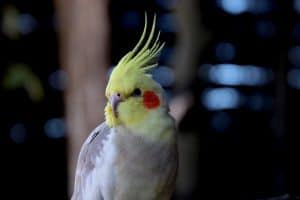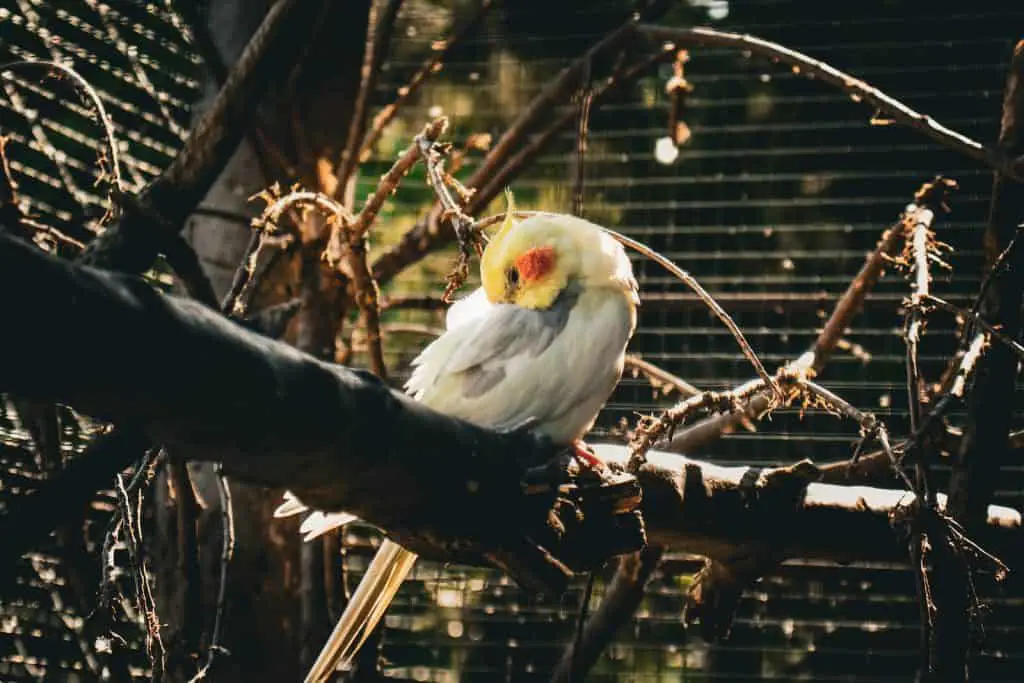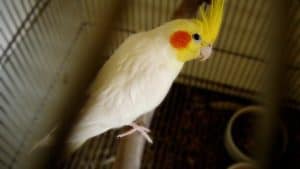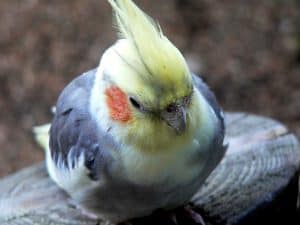Cockatiels are beloved pets known for their intelligence, affectionate nature, and playful personalities. However, even the friendliest cockatiel bites sometimes , and it can be a painful and startling experience for their owners. If you find yourself in a situation where your cockatiel has bitten you, it’s essential to understand why it happened and how to prevent it from happening in the future.
In this article, we will discuss the possible reasons behind a cockatiel’s biting behavior and provide some practical tips on what to do if your cockatiel bites you. With patience, understanding, and consistent training, you can help your feathered friend develop better habits and foster a stronger bond between you and your pet.

Why Does My Cockatiel Bite Me?
Using a bird’s beaks is one of their primary forms of communication, so they like to use them. If you discover that your cockatiel bites everything in its path, there are a few things you should know.
Naturally, cockatiels bite and chew, so it’s worth noting that this is a natural behavior for them and not bad behavior. This can be seen in the wild all the time.
As cockatiels mature, they bite, shred, and chew through a variety of materials in order to make their nests.
Despite the fact that it is in captivity, your domesticated cockatiel will exhibit this conduct as well. They’ll put everything in their mouths, just like human infants.
Cockatiels use their beaks to discover their surroundings. The beak is a vital instrument for exploration, therefore it’s very probable that your young cockatiel bites due to this.
If you’ve just gotten a cockatiel and it’s still unfamiliar with you, it may creep up to you and begin chewing and nibbling on something nearby.
This is a wonderful development for your bird’s relationship with you, as it indicates that it is gradually beginning to trust you by stepping out of its cage (the safe zone) in search of anything to bite.
So it’s not all bad behavior. As a matter of fact, it’s actually a good thing. But here’s the problem.
Your cockatiel is eating things that aren’t meant to be chewed, which is costing you money!
What to Do if Your Cockatiel Bites You?
However, biting is a natural response and one that cockatiels are known for. However, it may be preferable to discourage your cockatiel from biting from time to time.
It’s also possible that your cockatiel is nibbling on something dangerous like electrical cords or your jewelry. They could be chewing on your curtains, sofa, or anything else!
Regardless of the cause cockatiel bites, it’s useful to have some methods at your disposal in order to persuade your cockatiel that biting certain items is not advised. You can’t stop your cockatiel from biting itself since it is part of its nature, but you can redirect its biting toward something acceptable.
Take a look at the other resources that may help you be more successful with your bird training. For example, investigate any pet shop’s foraging toys.
You can also fill them with goodies, which may entice your bird to try them rather than attacking your socks. When you let your cockatiel out of its cage, it’s a good idea to keep an eye on it and put away anything that it might get ahold of.
Instead, scatter foraging toys around for your cockatiel to rip apart with items like wood or paper that most cockatiels enjoy shredding.
- 11 PIECES BIRD TOYS: The bird toys include 11Pieces parrot toys to meet most bird's needs.Crisp bells' sounds and colorful wooden toys will catch the attention of your birds,they will spend most time to play with their interesting new toys. they are suitable for bird sports,standing,climbing, playing, chewing, resting,etc. It's the perfect gift for your bird friends.
- FOR VARIOUS BIRDS:Our bird toys provide your birds a good elevated place to meet your birds' natural needs; Make most birds do exercise ,strengthen their muscles, exactly suit for small parakeets, cockatiels, conures, macaws, parrots, love birds, Mynahs, finches ,pineapples ect.
- SAFE: These small interesting Bird toys are made of natural wood that dyed with edible color,which ensure the health and safety of your pet birds. They are completely handmade, very durable and bite-resistant. They can easily draw the attention of your pet parrots in a short time,climbbing and exploring.
- EASY TO INSTALL: All bird cage toys come with an hook which can attaches to the top of the bird cage easily.With these interesting bird toys attached in their cage,saving space and decorating the cage, your birds will have fun every day.
- GUARANTEE: If you are not satisfied with our products, just return it and a refund will do; we provide 24 hours customer services, please feel free to contact us.
Why Is My Cockatiel Biting Me All Of a Sudden?
It’s frightening if your normally loving cockatiel changes your personality and becomes a biting cockatiel.
Female and male sockatiels will not bite without cause, so what could be the cause of your bird’s strange behavior? Boredom in cockatiel’s cage is a common reason for feather-fluffed out feathers, irritability, or squawking.
When you attempt to stroke or hold your sleep-deprived cockatiel, it may show aggressive behavior and bite like a grumpy person. It’s important to allow your bird all of the rest it requires and desires in order to keep a pleasant bird in your care.
Cockatiels are generally friendly and affectionate pets, but they can bite their owners for several reasons. If your cockatiel has started biting you all of a sudden, there could be some underlying causes that you need to address. Here are some possible reasons why your cockatiel is biting you:
- Fear: Cockatiels can be easily frightened by sudden movements, loud noises, or unfamiliar objects. If your bird is feeling scared or threatened, they may resort to biting as a defensive mechanism.
- Hormonal changes: During breeding season, cockatiels may become more territorial and aggressive, especially if they feel that their nesting area is being threatened. If your bird is biting you more frequently during breeding season, it may be due to hormonal changes.
- Health issues: Cockatiels may become irritable or aggressive if they are not feeling well. If your bird is biting you suddenly and exhibiting other signs of illness, such as lethargy or loss of appetite, it may be time to take them to a veterinarian.
- Lack of socialization: If your bird has not been socialized properly, they may be more prone to biting. Cockatiels that are not accustomed to being handled or are not used to being around people may feel threatened or scared, leading to biting behavior.
- Attention-seeking: Cockatiels are social pet birds and crave attention from their owners. If your bird is not getting enough attention or is feeling neglected, it may bite you to get your attention.
In summary, if your cockatiel is biting you all of a sudden, it’s essential to identify the underlying cause and address it accordingly. With patience, training, and socialization, you can help your pet parrot overcome their biting behavior and build a stronger bond with your feathered friend.
Are Cockatiel Bites Dangerous?
Cockatiel bites are generally not dangerous, but they can be painful and cause bleeding. The strength of the bite depends on the size and strength of the bird’s beak, as well as the force of the bite. Cockatiels have strong beaks that they use to crack open seeds and nuts, and their bites can hurt, especially if they bite down hard.
In addition to the physical pain, cockatiel bites can also cause psychological distress. If your bird bites you frequently, it can be a stressful and unpleasant experience that can make you feel anxious or scared around your pet.
It’s also essential to keep in mind that cockatiels can carry bacteria in their beaks, which can cause infections if they bite you. Therefore, if you experience redness, swelling, or other signs of infection after a cockatiel bite, it’s essential to clean the wound thoroughly and seek medical attention if necessary.
In summary, cockatiel bites are generally not dangerous, but they can be painful and cause physical and psychological distress. It’s essential to take steps to prevent biting behavior and address it if it does occur, both for your safety and the well-being of your feathered friend.
Do Cockatiel Bites Hurt?
Yes, pet cockatiel bites can hurt, especially if the pet bird bites down hard. Cockatiels have strong beaks that they use to crack open seeds and nuts, and they can exert a significant amount of pressure when biting. While the pain from a cockatiel bite may not be as intense as that from a larger bird or other animal, it can still be quite uncomfortable and cause bleeding.
The severity of the pain from a cockatiel bite can vary depending on several factors, such as the size and strength of the bird, the force of the bite, and the location of the bite. Bites on sensitive areas such as the fingers, ears, or face can be particularly painful.
It’s also important to keep in mind that repeated biting can cause psychological distress, which can be just as unpleasant as the physical pain. If your cockatiel is biting you frequently, it’s important to address the behavior and take steps to prevent it from happening in the future.
In summary, cockatiel bites can be painful, and it’s essential to take steps to prevent them from occurring. With proper training, socialization, and patience, you can help your cockatiel overcome its biting behavior and foster a stronger bond between you and your feathered friend.
For more valuable insights and tips on cockatiel care and related topics, be sure to read our other informative articles. Find out if leeks are a safe addition to your bird’s diet in Can Cockatiels Eat Leeks?. If you’re curious about kidney beans, learn whether they are suitable for your cockatiel by checking out Can Cockatiels Eat Kidney Beans?. Ensure a safe environment for your pet by exploring Are Paint Fumes Bad for Cockatiels?. For a unique perspective on health, delve into Chocolate and Dental Health. Lastly, gain a better understanding of cockatiel behaviors by reading Why Does a Cockatiel Stand on One Leg?. Each of these articles is packed with valuable information to help you ensure your cockatiel’s health and happiness.





Very interesting points you have remarked, appreciate it for putting up.Blog monetyze